The Quiet Rise of Black Home Educators
Black families are leading an exodus from public and private schools
Education
THE QUIET RISE OF BLACK HOME EDUCATORS
Black families are leading an exodus from public and private schools
Connie Morgan
Editor’s note: This is the first in a series of articles on education by Connie and the first in a series of “Back to School” articles we will publish over the coming weeks.
This article discusses some reasons for the recent rise in black homeschooling, including religiosity, dissatisfaction with public school curricula, and a desire to avoid racist bullying. It features excerpts from interviews I conducted with Joyce Burges, founder of National Black Home Educators (NBHE), Dr. Cheryl Fields-Smith, black home educating researcher, and Dr. Brian Ray, founder of the National Home Education Research Institute. It surveys some of the black homeschooling curricula on offer, such as Afro-centric as well as traditional classical curricula. It concludes by recognizing the common goals of all homeschoolers regardless of ethnic background. This article is the first in a series of education pieces. It will be followed by a deeper exploration of the black classical education tradition.
A certain image tends to pop into people’s minds when they hear “homeschool”: white Christian conservatives or maybe a hippie family. Yet black home educators are the fastest growing homeschool group in America and were before the pandemic. Homeschooling overall has doubled while black homeschooling has more than quadrupled. Black children are now more likely to be homeschooled than children of any other ethnic group. No other homeschooling demographic managed to double let alone quadruple in the wake of the pandemic. The cause of the unprecedented spike in black homeschooling is still somewhat mysterious. Are blacks more unsatisfied with Covid responses compared to other groups? Is it newly awakened concerns about racism? After trying homeschooling out of necessity, did black families discover that homeschooling is just a good fit culturally?
Dr. Cheryl Fields-Smith, Associate Professor of Education at the University of Georgia, whom some might call the pioneer of black homeschool research, started looking into the motivations of black homeschoolers in 2006. She theorizes that motivations may have changed slightly and a desire for stricter Covid precautions may have led many black parents to continue educating their children at home even after schools reinstated in-person learning. However, states and cities with higher black populations often had aggressive responses to Covid. It was largely rural white areas with the most relaxed responses. Additionally, blacks are less likely to be vaccinated compared to whites. According to a Rasmussen poll, 58% of white Democrats believe the Covid lockdowns were not overly harmful, yet 51% of black Democrats believe the lockdowns did more harm than good. These facts can be interpreted to indicate that blacks weren’t as concerned about Covid as whites. Even if Dr. Fields-Smith’s hunch is correct, there doesn’t seem to be any evidence that blacks are two or three times more scared of Covid than whites. Thus, Covid aversion does not seem to be the main reason behind the disparate spike in black as compared to white homeschooling.
Parents across demographics consistently cite three reasons to homeschool:
● A desire to teach religion
● School environment concerns (racism, bullying, etc.)
● Dissatisfaction with the curriculum
Black homeschoolers trend the same as whites in their reasoning for homeschooling, though they may break with their white or Hispanic peers in their desire to emphasize black history or culture. When forced into homeschooling, many black parents, even in single-parenting and other non-traditional arrangements, found it manageable. Dr. Fields-Smith’s research shined a light on single black mothers’ success in homeschooling in 2020. In addition, we’ve seen stories of unconventional black homeschooling pop up more and more.
The stereotype of homeschoolers as white conservative families doesn’t jibe with the data. Before the pandemic, 41% of homeschoolers were not white. Today, nearly 50% of homeschoolers are ethnic minorities with both blacks and Hispanics ahead of whites in terms of rates of homeschooling within their respective groups. Just over 16% of black households are now homeschooled compared to less than 10% of whites (see Figure 1). Now that so many black families have been exposed to homeschooling, many are finding it is a natural fit not just for teaching general academics but for imparting religious values as well.
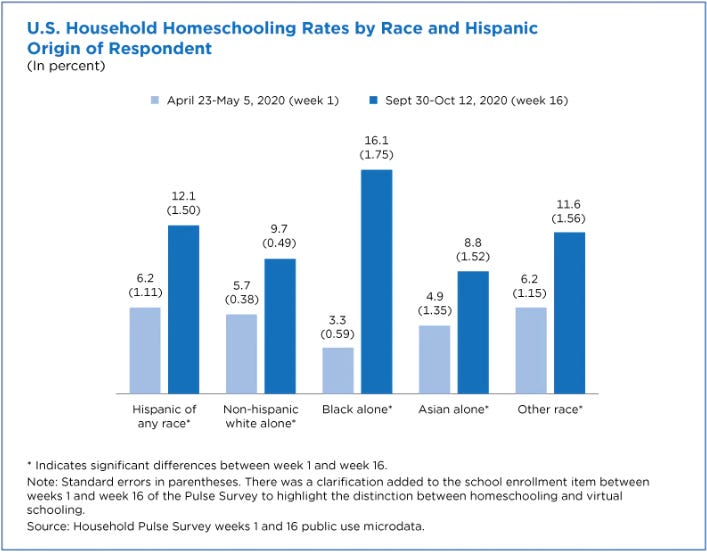
Compared to white parents, black homeschooling parents are just as or even more interested in teaching religious values to their children. Research from 2016 found that 51% of all parents homeschool because of religious convictions. For black homeschoolers, that percentage was 47%, with religion being the number one reason blacks gave for homeschooling. This shouldn’t come as a surprise because blacks are consistently the most religious ethnic group in America. One Pew study found that 97% of black adults believe in God. According to a recent Gallup poll, 88% of people of color believe in God, making them the third most theistic demographic in America, behind self identified conservatives and Republicans (categories that of course include “people of color”). Given the high concentration of religious blacks in America, it is somewhat surprising that blacks didn’t lead whites in homeschooling before the pandemic.
Bullying and discrimination are frequent concerns of black parents. A 2014 study in the Journal of Child and Adolescent Psychiatric Nursing found that black children have higher rates of bullying, and are more likely to be involved as a victim, aggressor, or bystander than other children. Whether race-based or not, whether their child is a victim or aggressor, homeschooling allows parents to address bullying problems with a high degree of efficacy.
Black children are also punished in school more than white children (see Figure 2). Whether this is due to racism or legitimate bad behavior (such as the aforementioned bullying) is somewhat irrelevant: either way, homeschooling allows parents to eliminate the problem. Black boys in particular struggle in school, both academically and behaviorally. There is even research suggesting that in the classroom, children’s behavior gets inappropriately equated with IQ indicators. If black children are perceived as troublemakers, whether accurately or not, they are also perceived as unintelligent. Black schools are some of the worst in America. In 2017, 19 out of the 20 lowest performing schools in America were either majority or disproportionately black.
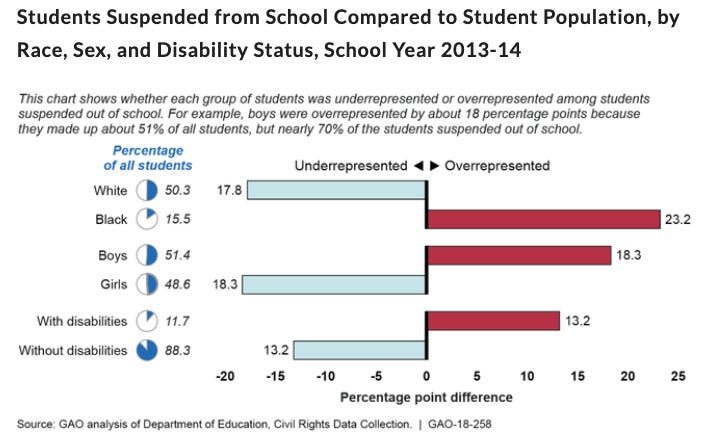
Perceived unintelligence also manifests in well-intentioned woke ideology. Black parents are faced with schools that are lowering the standards for black children. Efforts to lower standards or do away with measurements in order to achieve equity are based, broadly speaking, in Critical Race Theory (CRT). Many black parents and educators have spoken out against the racial essentialism forwarded by CRT. Longtime black homeschool advocate and founder of National Black Home Educators (NBHE), Joyce Burges said the following in a 2021 interview:
“We don’t want our children to go to school and learn that, because of white supremacy, or white privilege – that’s why you can’t achieve. We do not agree with this. My concern is that parents understand that, and know, that our parents at National Black Home Educators stand firm against this. We will not allow a system to teach our children that the reason they cannot achieve is because somebody has a hammer over their head.”
Burges has been in the black homeschooling movement for decades and founded NBHE in 2000 with her husband, Eric Burges. She has seen demand for her services explode during the pandemic. Although against CRT, Burges strongly advocates for pro-black representation in education. She has dedicated much of her life to building a curriculum that foregrounds the contributions of black Americans. In her interview with me, Burges poignantly shared several awkward moments she has had with white mothers when she pushed them to explore teaching more diverse characters in their homeschool lessons.
“One time, a white woman came up to me at an event so nervous her hands were shaking. I asked her, why are you nervous right now? And she told me ‘I don’t know how to teach this [a story about a little black girl].’ I said teach it the same way you teach Anne of Green Gables – read and enjoy it!”
White parents sincerely interested in giving their children a diverse education sometimes feel “damned if they do, damned if they don’t.” They often get accused of either shielding their children from uncomfortable truths or invading black spaces, feeling immense pressure to teach black history the “right” way. I joined a large black homeschooling Facebook group whose front page announced “need not apply if white.” If a goal is to share teaching resources that diversify lesson plans, why wouldn’t you want white parents buying in? If racism is a major concern, white parents should be a target audience.
While Burges focuses on black home educators, her organization happily serves a number of white families, and all are welcome to her resources. However, NBHE stands somewhat alone in its anti-racial essentialist stance within the black homeschooling community. The Liberated Minds Institute gives out “blacknificent awards” and promotes an “Afrikan-centered” curriculum. This includes classes such as “Social Justice, Activism and Strategic Organizing for Youth” (Figure 3) and “Afrikan Math.” Another website, Woke Homeschooling, is a result of the Covid homeschooling boom and was created by a black mom and marketed to black families. Heritage Mom is a popular homeschooling blog run by a black Christian woman who claims that in her house “Charlotte Mason has an afro” and she infuses the education pioneer’s writings with “blackness.”
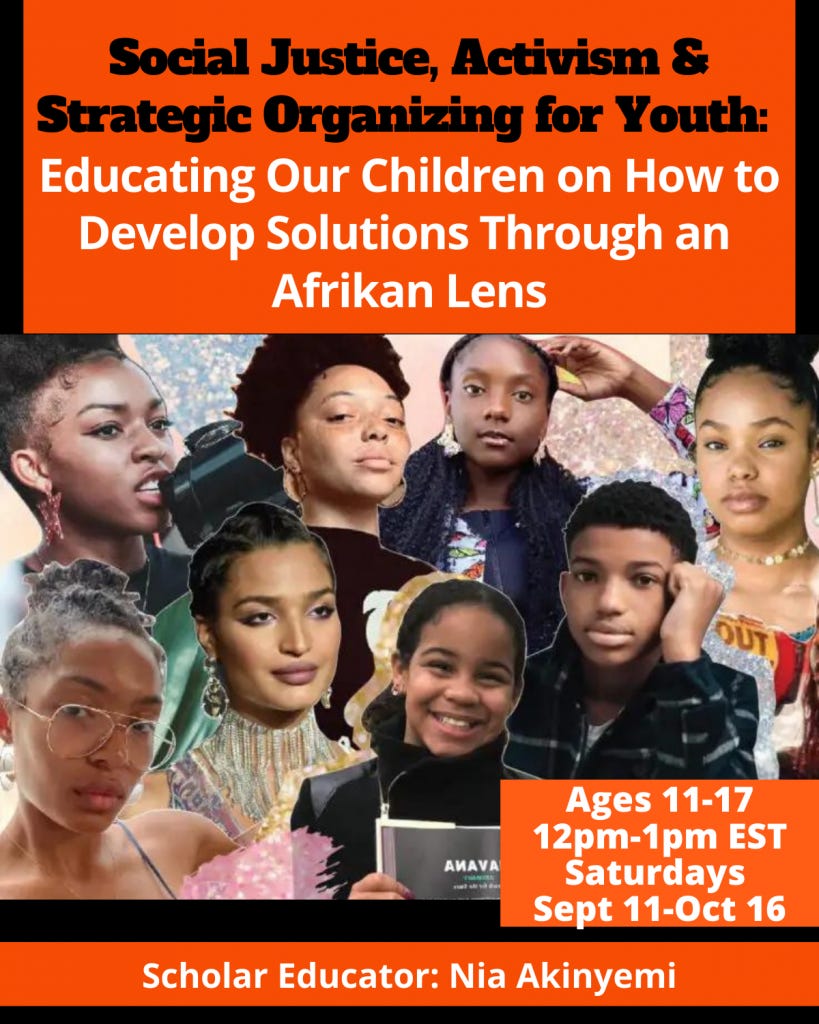
All of which raises questions: Does everything have to be about race? Do children really need to be social justice warriors? Does math have to be Afrikan? Can we appreciate white thinkers without making it all about us (black people)? It seems racial essentialism may be more prevalent in some black homeschooling communities than in public schools.
There are some black educators pushing back against Kendi-style indoctrination. Dr. Angel Adams Parham and Dr. Anika Prather are proponents of classical education and co-wrote a book titled The Black Intellectual Tradition, released in July. Dr. Parham founded Nyansa Classical Community and Dr. Prather founded The Living Water School. Both are classically inspired education systems that can be implemented in the home or in a school setting. While there has been a push to get rid of classics due to perceived racism, Dr. Parham has publicly written in defense of the tradition. As Dr. Fields-Smith’s research points out, many disenchanted black families are seeking out a black culture centered education for their children; Dr. Prather would respond by explaining that the classical tradition is black culture.
Dr. Fields-Smith describes home educating as a form of resistance among black homeschooling parents, the soul of which is represented by bell hooks’ essay “Homeplace: A Site of Resistance.” What is being resisted exactly? It could be any number of things but according to Fields-Smith, for black families it is mainly a “white-centered” curriculum. Fields-Smith’s qualitative research has found that black families want more expansive history lessons. They want their children to learn not just what was happening with American troops in Europe and Asia during WWII but what was going on in Africa as well. Black families want math’s connection to ancient Egypt foregrounded during math lessons. They want their children to see lots of black characters in their school books.
So perhaps the question isn’t, why are so many black families homeschooling right now, but rather, why aren’t more? Religious convictions, curriculum reservations, and historical race-based bullying should lead many more black families to homeschool. Black homeschooling parents have reported pushback in their own families from older family members who see homeschool as a foreign concept and may recall the challenge of integrating schools. Fields-Smith explained it to me as follows:
“Some [black Americans] may feel that homeschooling is disrespecting those who came before us. They know how much work was put into access to public education by black trailblazers, so they may feel guilty walking away.”
In recent years, Fields-Smith has found that much of the older generational pushback has dissipated. She has come to understand that intergenerationally, many black families feel the hopes attached to the Brown vs. Board of Education mandate have never been fully realized.
The rise in not only black homeschool participants but black homeschool leaders shows that black attitudes toward homeschooling are changing in a big way. A field once dominated by white religious educators has seen a new market in progressive homeschool curricula.
After going through dozens of these “Afro-centric” education blogs and websites, I couldn’t find a clear definition of the idiom. How do I know if I am getting an Afro-centric education? Does every subject have to relate back to Africa? Does every history lesson have to include a black person? Or if only 25% of the lessons do, is that enough? How does a “black education” differ from a “white education?” If something is valuable enough that one group of American children should learn it, is it not valuable enough that all American children should?
I asked Dr. Fields-Smith this question. She reflected on the calling of her own heart to attend an HBCU in order to “be with my people.” She described an Afro-centric education as a you-know-it-when-you-see-it kind of thing. She may be right, but some clear standards would be useful, especially if a lack of diverse lesson plans is something we want to fix in our public or private schools.
On a call with Dr. Brian Ray, founder of the National Home Education Research Institute, I explained the concept of resistance embodied in black homeschooling as relayed to me by Dr. Fields-Smith. The phone vibrated as Dr. Ray enthusiastically exclaimed, “YES! Black home educators are resisting an oppressive system...but so are all home educating families!”
And that may be the lesson of this homeschool exploration. Families of all stripes find traditional school oppressive. Home educating, or in other words taking responsibility for your children’s emotional, intellectual, physical and spiritual foundation should be a racially unifying cause beyond politics, religion, or petty differences.
All ethnic groups perform better when homeschooled, though black children see bigger gains in achievement than white children when both are compared to their publicly educated peers. The home-educated typically score 15 to 30 percentage points above public school students on standardized academic achievement tests. A 2015 study by Dr. Ray found that black homeschool students score 23 to 42 percentage points above black public school students. It’s not just black boys who are underserved by the traditional school setting but boys in general. A classroom setting is not the ideal learning environment for the average boy. Boys are simply more likely to be disengaged at school than girls. Public school curricula tend to get dusty and unappealing to all families. Changes to public school curricula take time-consuming bureaucratic effort (experts say 9-12 months) and can’t be tailored to your child’s individual needs or interests. The complaints black families have about traditional schools overlap significantly with the complaints all families have.
Call it religion, call it philosophy, call it a value system: someone is pouring a moral framework into your child that will become the foundation of their identity. All parents have a vested interest in making sure that that someone is Mom and Dad.
“I desired to raise children I wanted to spend time with as adults,” reflected Burges. “Parents can pour the best of themselves into their children.”
Homeschool has the potential to be a unifier for a broad coalition of disenfranchised parents but still feels somewhat segregated, perhaps in large part because black homeschoolers seem to want it that way. If we can all agree on one thing it’s that nothing is more precious to us than our children and their well-being. If homeschooling benefits them, let’s do it together, hand-in-hand.
Connie Morgan is a Christian, wife, and mother living in Washington state. She started her professional life in the craft-beer industry and is now transitioning out of the Armed Forces, where she served as a military intelligence officer. Her first post-military civilian job is with Free Black Thought, where she is currently researching and writing about education and other issues. Follow her on Twitter and subscribe to her new Substack.

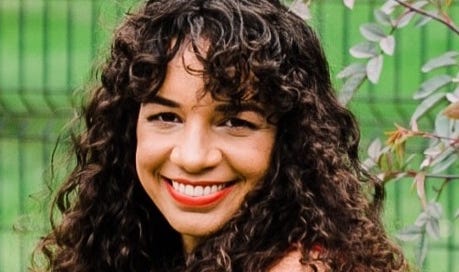


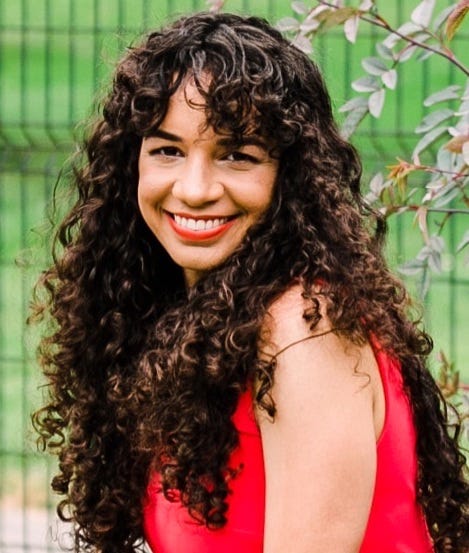
This article should be republished at the New York Times, Wall Street Journal, USA Today, even my local San Diego Union Tribune. Lots of hand wringing could be ended simply by telling it like it is. My favorite come to Jesus moment is: "I joined a large black homeschooling Facebook group whose front page announced “need not apply if white.” If a goal is to share teaching resources that diversify lesson plans, why wouldn’t you want white parents buying in? If racism is a major concern, white parents should be a target audience." Yes, let's be able to listen and learn from each other. Waiting to hear more from (following jt) M. Morgan.
“Black schools are some of the worst in America. In 2017, 19 out of the 20 lowest performing schools in America were either majority or disproportionately black.”
Why is this acceptable to anyone? Government schools (I refuse to call them public schools as they do not serve the public) continue to suck for decades on end because (a) they cannot go bankrupt no matter how badly they fail their students, and as a result have no incentive to innovate or improve, and (b) teachers’ unions make it difficult or impossible to fire incompetent teachers. As such, I applaud parents who have the guts and wisdom to take matters into their own hands, as they will surely do a better job than the bloated cesspools of inefficiency and mediocrity that are government schools. If I had my way all government schools would be abolished and all the money currently wasted on them would be allocated directly to parents, to either allow them to homeschool, or to pay tuition at private schools -- where, if they suck, they will go out of business, thus giving them an incentive not to suck.